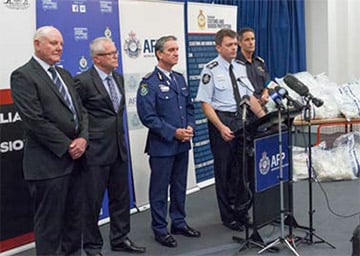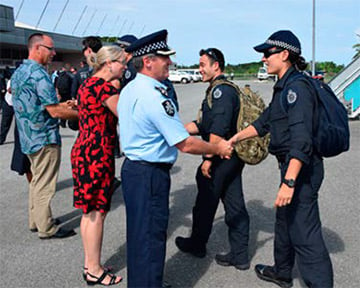Our Operating Environment
The AFP operates within a continuously changing and complex environment.
Over the last 15 years the depth and breadth of AFP responsibilities have expanded significantly. Our activities now occur in numerous work settings, with a corresponding wide range of operating environment and jurisdictional issues.
The AFP’s success will be contingent on developing capabilities and innovative solutions to gain an advantage in this environment.
Globalisation and technology

Globalisation combined with the pervasiveness of internet-enabled communication, such as internet-enabled mobile devices, encrypted communication technology, mass communication and social media has changed the nature of policing. Cybercrime is a mainstay of criminal activity.
Criminal and terrorist groups are sophisticated users of technology enabling them to operate across multiple jurisdictions. Terrorist groups are exploiting social media to radicalise Australians to fight offshore or promote terrorism domestically.
Australian computer networks (including the AFP’s own systems) continue to be the target of cyber intrusion and attack. Criminal groups employ malware to obtain funds from financial service providers. Counter surveillance and encryption technology is now widely accessible and cheap, and private sector companies possess huge data sets which can assist law enforcement.
Terrorism

In 2014 Australia’s national threat level was raised to high, indicating that a terrorist attack is likely. Radicalised Australians have since undertaken domestic terrorist attacks and others, intent on travelling to foreign conflicts, continue to be identified. Around 120 Australians are currently fighting in Syria and Iraq.
As the conflict continues the number of Australians participating in foreign conflicts or actively supporting extremist groups is likely to increase. The high domestic terrorist threat is therefore unlikely to change in the near future.
Transnational serious and organised crime

Serious and organised crime remains transnational in nature. Groups are aggressively expanding, seeking to insulate criminal operations from the AFP by locating senior members, facilitators and critical capabilities offshore.
Transnational crime continues to be influenced and facilitated by global financial markets, trade agreements and migration flows. Private industry control and influence of these sectors require enhanced industry relationships, including increased data sharing and improved business practices to reduce the threat and impact of organised crime.
Regional stability

Australia contributes to peace and stability efforts in the Indo-Pacific region and is likely to be called upon to provide security, humanitarian and disaster management support. This includes assistance through peacekeeping to help provide socio-political stability and law enforcement. This is achieved through capacity-building activities in the support of rule of law.
The Jakarta Centre for Law Enforcement Cooperation (JCLEC) is a prime example of long-term regional cooperative liaison and capacity building. JCLEC was established by the Indonesian and Australian Governments in 2004 as a training resource for the South East Asia region in the fight against transnational crime and terrorism. Since its establishment other countries have also supported its training role through the provision of technical assistance and funding. This institution will continue to be an important platform for operational collaboration between Australia, Indonesia and other regional partners into the future.
The economy and fiscal environment
The combination of changes to the fiscal environment, evolving criminal threats and the dynamic nature of law enforcement, increases the difficulty of balancing frontline police resources with adequate investment in innovation. There will be an ongoing critical need to appropriately prioritise the use of resources.
